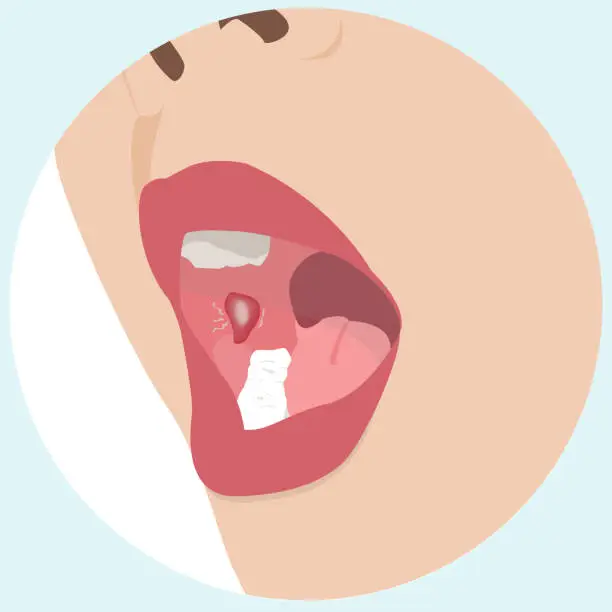mouth ulcer (also termed an oral ulcer, or a mucosal ulcer). What is Mouth Ulcer? is an ulcer that occurs on the mucous membrane of the oral cavity. More plainly, a mouth ulcer is a sore or open lesion in the mouth. Mouth ulcers are very common, occurring in association with many diseases and by many different mechanisms, but usually there is no serious underlying cause. causes of oral ulceration The two most common causes of oral ulceration are: local trauma (e.g. rubbing from a sharp edge on a filling) and aphthous stomatitis (“canker sores”). a condition characterized by recurrent formation of oral ulcers for largely unknown reasons. Some consider ulcers on the lips or on the skin around the mouth to be included under the general term oral ulceration (e.g. an ulcer left by rupture of a blister caused by herpes labialis, i.e. a cold sore). Mouth ulcers often cause pain and discomfort, and may alter the person’s choice of food while healing occurs (e.g. avoiding acidic or spicy foods and beverages). They may occur singly or multiple ulcers may occur at the same time (a “crop” of ulcers). Once formed, the ulcer may be maintained by inflammation and/or secondary infection. Aphthous stomatitis (also termed recurrent aphthous stomatits, RAS, and commonly called “canker sores”) is a very common cause of oral ulceration. 10-25% of the general population suffer from this non-contagious condition. The appearance of aphthous stomatitis varies as there are 3 types: minor aphthous ulceration. major aphthous ulceration. herpetiform ulceration. Minor aphthous ulceration is the most common type. presenting with 1-6 small (2-4mm diameter), round/oval ulcers with a yellow-grey color and an erythematous (red) “halo”. These ulcers heal with no permanent scarring in about 7–10 days. Ulcers recur at intervals of about 1–4 months. Major aphthous ulceration is less common than the minor type, but produces more severe lesions and symptoms. Major aphthous ulceration presents with larger (>1 cm diameter) ulcers that take much longer to heal (10–40 days) and may leave scarring. The minor and major subtypes of aphthous stomatitis usually produce lesions on the non-keratonized oral mucosa (i.e. the inside of the cheeks, lips, underneath the tongue and the floor of mouth), but less commonly major aphthous ulcers may occur in other parts of the mouth on keratinized mucosal surfaces. The least common type is herpetiform ulceration, so named because the condition resembles primary herpetic gingivostomatitis. The exact cause of aphthous stomatitis is unknown, but there may be a genetic predisposition in some people. Other possible causes include: hematinic deficiency (folate, vitamin B, iron). stopping smoking, stress, menstruation. trauma. food allergies or hypersensitivity to sodium lauryl sulphate (found in many brands of toothpaste). Aphthous stomatitis has no clinically detectable signs or symptoms outside the mouth, but the recurrent ulceration can cause much discomfort to sufferers. The Treatment is aimed at reducing the pain and swelling and speeding healing, and may involve systemic or topical steroids, analgesics (pain killers), antiseptics, anti-inflammatories or barrier pastes to protect the raw area. treatment of Mouth Ulcer Treatment is cause related, but also symptomatic if the underlying cause is unknown or not correctable. It is also important to note that most ulcers will heal completely without any intervention. Treatment can range from simply smoothing or removing a local cause of trauma, to addressing underlying factors such as dry mouth or substituting a problem medication. Maintaining good oral hygiene and use of an antiseptic mouthwashes/sprays (e.g. chlorhexidine) can prevent secondary infection and therefore hasten healing. A topical analgesic (e.g. benzydamine mouthwash) may reduce pain. Topical (gels, creams or inhalers) or systemic steroids may be used to reduce inflammation. An antifungal drug may be used to prevent oral candidiasis developing in those who use prolonged steroids. People with mouth ulcers may prefer to avoid hot or spicy foods, which can increase the pain. Self-inflicted ulceration can be difficult to manage, and psychiatric input may be required in some people. European Dental Center; best dental clinic in Jordan provide this information about Mouth Ulcer.









